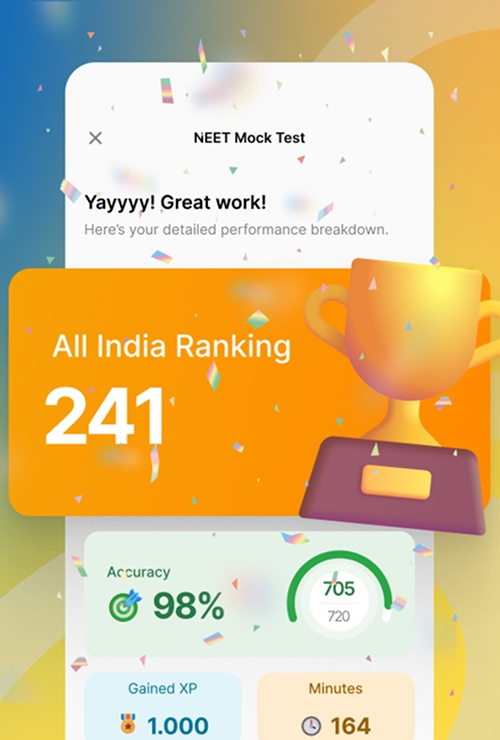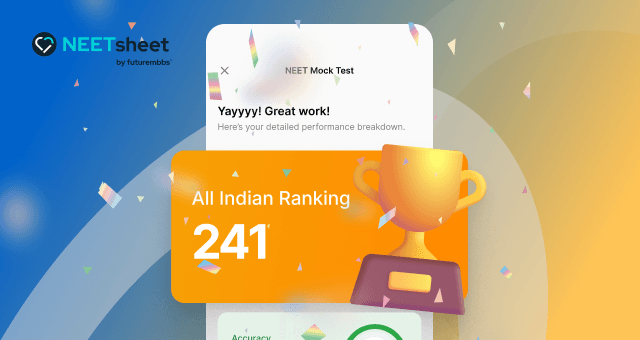
☝️ At a glance
- Digital flashcards help MBBS students master vast syllabi through active recall and spaced repetition, improving memory and retention significantly.
- Top apps like Anki, Quizlet, and Osmosis offer ready-made decks and smart features tailored for medical learning efficiency.
- Effective flashcards are short, focused, and visual, especially useful for high-yield subjects like anatomy, pharmacology, and pathology.
- Flashcards work best when used daily and in combination with lectures and MCQs, making them a smart tool for MBBS and NEET success.
The MBBS journey is overwhelming, with a vast syllabus demanding intense memorization. Traditional methods often fall short, leaving students stressed. Enter flashcards—a powerful, science-backed tool leveraging active recall and spaced repetition to enhance retention. Now, digital flashcards take learning further, offering portability, customization, and smart algorithms tailored for medical students. Whether mastering anatomy, pharmacology, or pathology, digital medical learning tools like Anki or Quizlet make studying efficient and effective. Say goodbye to rote memorization and embrace a smarter way to ace exams. Ready to transform your MBBS prep? Discover how digital flashcards can revolutionize your study routine in this article with futureMBBS, and for more medical related news and updates in future, keep visiting us.

Become a global doctor with MBBS abroad!
Studying abroad can be affordable and stress-free with futureMBBS:
- World-recognized universities with English-taught programs
- On-site support in partner university cities
- Guaranteed placements & internships for hands-on experience
From selecting universities and supporting you with the application process to orientation and finding accommodation – we are at your side.
Why MBBS students need efficient study tools
The challenge of retaining vast medical knowledge
MBBS students must master an overwhelming amount of information—over 20,000 medical terms, complex pathways, and intricate concepts across subjects like anatomy, pharmacology, and biochemistry. Rote memorization often leads to quick forgetting, making exam preparation and clinical application difficult. Without structured revision, critical details fade, forcing last-minute cramming—a stressful and ineffective approach.
Passive vs. active learning
Traditional study methods (re-reading notes, highlighting textbooks) are passive, leading to weak long-term retention. In contrast, digital flashcards leverage active recall and spaced repetition, forcing the brain to retrieve information repeatedly. Research by the Learning Scientists shows these techniques improve retention by 50% or more, making them ideal for medical students. By engaging actively with the material, MBBS aspirants can study smarter—not harder—and retain knowledge for exams and beyond.

Study medicine abroad with 100% support!
futureMBBS offers full support to make your dream of studying medicine abroad a reality.
- Hassle-free admission guidance
- Fast-tracked visa processing
- Post-arrival support, including accommodation assistance
What are digital flashcards and how do they work?
Definition & difference from physical flashcards
Digital flashcards are the modern evolution of traditional paper cards—portable, customizable, and powered by smart algorithms. Unlike physical flashcards, they support interactive formats like image labeling, audio clips, and multiple-choice questions, making them ideal for visual and auditory learners. Digital platforms also allow easy organization, tagging, and cloud syncing across devices, ensuring your study materials are always accessible.
Learning science behind flashcards
Digital flashcards maximize retention using two key principles:
1. Spaced repetition: Based on the Ebbinghaus Forgetting Curve, this method schedules reviews just before you’re likely to forget, strengthening memory over time.
2. Active recall: Instead of passively re-reading notes, flashcards force your brain to retrieve information, which enhances long-term memory encoding.
Together, these techniques make digital cards a game-changer for MBBS students tackling vast medical content.
Benefits of using digital flashcards for MBBS Preparation
Following are the various learning styles that you can follow:
1. Portability and accessibility:
One major benefit of Digital flashcards is that it offers the advantage allowing students to access of being accessible anytime, anywhere. Whether you're commuting, waiting for a lecture to start, or enjoying a coffee break, you can pull out your device and review key medical concepts effortlessly.
2. Active recall:
Effective learning is based on the fundamental idea of active recall. With the help of digital flashcards, you can actively retrieve information from memory, strengthening conceptual relationships and improving long-term memory.
3. Spaced repetition:
Utilizing spaced repetition algorithms, many digital flashcard platforms allow you to customize your study sessions to concentrate on the cards that pose greater challenges. By optimizing the timing of information reviews, this technique gradually improves retention.
4. Multimedia integration:
Add illustrations, flowcharts, and even sound to your online flashcards to improve your comprehension. Studying can become more interesting and memory-boosting when you use visual and auditory cues.
5. Collaboration and community:
Use collaborative features on digital platforms to establish connections with other medical students. Exchange flashcards, put each other to the test, and gain access to a shared knowledge base.
Best digital flashcard apps for MBBS students in 2025
With medical education becoming more dynamic, digital flashcard apps are essential for efficient learning. Here are the top 5 apps to supercharge your MBBS studies:
1. Anki
Features: Open-source, fully customizable, built-in spaced repetition (SRS)
Pros: Trusted by USMLE toppers, supports images & add-ons
Price: Free (Desktop), Paid (iOS)
2. Brainscape
Features: Certified medical decks, confidence-based repetition, progress tracking
Pros: Scientifically optimized, great for quick revisions
Price: Freemium (Premium starts at $9.99/month)
3. Quizlet
Features: User-friendly, multimedia cards (images/audio), collaborative study modes. Provides vast library of pre made flashcards.
Pros: Ideal for group study, pre-made medical decks available, you can create your own flashcards
Price: Free (Quizlet Plus for $7.99/month)
4. Osmosis Flashcards
Features: MBBS-tailored content, integrates with video lectures, clinical case links
Pros: High-yield for exams, NCLEX & USMLE-aligned
Price: Starts at $19.99/month
5. Notion (Custom Decks)
Features: Create linked flashcards within study dashboards, database-style organization
Pros: Seamless note-flashcard integration, highly flexible
Price: Free (Personal Pro $4/month)
How to create effective flashcards for medical studies
Follow these different types of proven techniques to build high-impact pre made flashcards:
1. Focus on high-yield information
Avoid information overload—cards should be concise and clinical. Convert facts into Q&A pairs:
Q. What is the antidote for heparin?
A. Protamine sulfate
Q. Most common organism in infective endocarditis?
A. Strep viridans (for native valves)
2. Use images & mnemonics
Anatomy: Add labeled diagrams (e.g., brachial plexus branches)
Pharmacology: Embed mnemonics (e.g., "ABCDE" for drug-induced lupus:
ACE inhibitors, Beta-blockers, Chlorpromazine, Dilantin, Ethambutol)
3. Apply the 80/20 rule
Prioritize high-frequency exam topics (e.g., MI management, electrolyte imbalances) over rare diseases.
Study techniques: Integrating flashcards into your MBBS routine
Flashcards are powerful, but how you use them determines their effectiveness. Here’s how to seamlessly blend them into your MBBS prep:
1. The 30-Min daily flashcard plan
Morning (15 min): Quick spaced repetition review (target forgotten cards first)
Night (15 min): Active recall session (cover 20–30 cards)
Bonus: Use idle time (commute, breaks) for mobile apps like Anki
2. Synergize with lectures & MCQs
Post-lecture: Create flashcards for key concepts within 24 hours (better retention)
Link to MCQs: When solving questions, reinforce weak areas with targeted flashcards
Example: After an ECG lecture, make cards on STEMI vs. NSTEMI criteria
3. Prevent burnout with smart scheduling
Pomodoro + Flashcards: 25-min study + 5-min flashcard review
Weekly limit: Cap new cards at 50/day to avoid backlog
Weekend reset: Clear pending reviews to stay on track
Common mistakes MBBS students make with flashcards
Flashcards are one of the most powerful study tools for medical students—but only when used correctly. Many MBBS students unknowingly undermine their effectiveness by making a few critical mistakes. One of the most common errors is overloading flashcards with too much information. A single card should cover one core concept—not an entire topic. Writing dense paragraphs defeats the purpose of quick, active recall.
Another major pitfall is ignoring spaced repetition systems (SRS). Without scheduled reviews, students often forget material and resort to inefficient last-minute cramming. Properly utilizing SRS algorithms (like those in Anki) ensures long-term retention.
Disorganization is another flashcard killer. Students who fail to tag and categorize their cards struggle with targeted revisions. A well-structured deck allows for focused study sessions on weak areas.
Finally, many students passively read their flashcards instead of actively recalling answers. Simply flipping through cards without testing yourself out loud or in writing leads to shallow learning. For maximum benefit, treat every flashcard as a mini self-quiz.
By avoiding these mistakes, MBBS students can transform their flashcards into a high-yield study weapon.
Quizzes: The dynamic assessment tool:
1. Interactive learning:
Testing oneself with quizzes encourages active learning. It motivates you to actively remember material rather than just reading through notes, which helps you to better understand important ideas.
2. Real-time feedback:
One useful feature of quizzes is instant feedback. As soon as possible, identify your areas of weakness and modify your focus. Learning progresses more quickly with this real-time feedback loop.
3. Simulation of exam conditions:
Frequent quizzes help you get acquainted with the format and time constraints of exams by simulating exam conditions. This helps to lessen test anxiety in addition to boosting your confidence.
4. Customization and variety:
Make quizzes with a focus on particular subjects or mix and match topics to reflect the comprehensive format of medical exams. Your study sessions remain interesting and demanding due to the variety of question formats.
5. Gamification for motivation:
A lot of quiz platforms use gamification features like achievements, leaderboards, and prizes. Playing a game during your study sessions can increase motivation and make learning interesting.
Conclusion:
For MBBS students interested and looking for efficient and entertaining study methods, digital flashcards and quizzes have become essential resources. You can improve active recall, make the most of study sessions, and turn learning into a fulfilling experience by incorporating these dynamic techniques into your daily routine. To make your MBBS journey successful and enjoyable, embrace the power of technology and use it to master the vast and basic concepts to complex field of medicine.
Your medical career abroad starts here!
Thinking of pursuing MBBS abroad? Don’t just dream it, do it!
Start your MBBS journey!FREQUENTLY ASKED QUESTIONS
FAQs about "Flashcard for MBBS"
1. How to make medical flashcards for MBBS?
Focus on high-yield topics. Use the Q&A format, keep it concise, and include images or mnemonics for complex concepts.
2. Are flashcards effective for NEET?
Yes, flashcards help with quick recall of facts and formulas (eg: respiratory system), making them a great tool for NEET revision.
3. What are good flashcards for medical school?
Good medical flashcards are ones that follow spaced repetition, are concise, and cover clinical medicine and theoretical topics — like Anki decks or Osmosis flashcards.
4. What is the best flashcard for medical students?
Anki is widely considered the best due to its custom decks and spaced repetition features tailored for medical studies.
5. Are flashcards good for med school?
Absolutely. They support long-term retention and efficient revision, especially for vast and detailed subjects like anatomy or pharmacology.
6. How to make flashcards for medical school?
Break complex topics into simple Q&A pairs, focus on key concepts, use diagrams where helpful, and follow spaced repetition for review.







